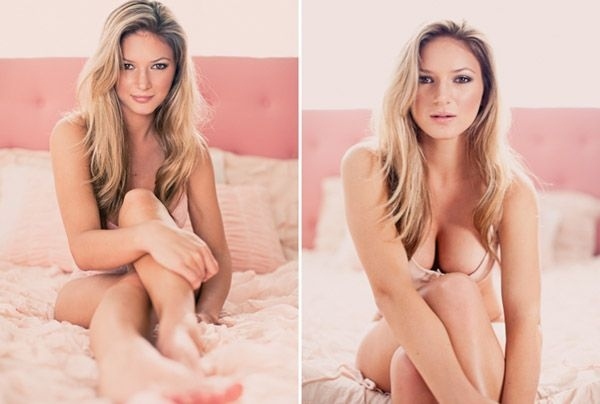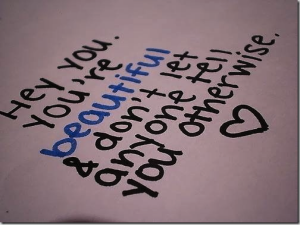
By Amber Ikeman (Intern 2014)
If you surf social media sites for more than 60 seconds at a time, you’ve probably come across a link to a BuzzFeed page. Facebook and other social media sites are riddled with links to videos, memes or quizzes that can easily impact ideals of beauty, gender and sexuality. Engaging with these pieces is not necessarily a bad thing, as long as we use a critical eye.
A recent BuzzFeed post titled “33 Impossibly Sexy Boudoir Photo Poses” is in many ways alluring and empowering, yet a little confusing. BuzzFeed did a great job featuring models of many different shapes, sizes, races, and ethnicities, reinforcing that there are many definitions of “sexy.” But what other messages is this sending us?
Let’s take a look at #20. We see a woman sitting with her legs crossed and her knees pulled slightly in to her torso. In this photo’s caption, BuzzFeed advises, “Sit with your knees up if you’re at all self-conscious about your belly area.” So, does this mean that self-consciousness is sexy? This feeds into insecurity and sends the message that we should hide ourselves instead of learning to love and take care of our bodies. This presents a contradictory message about the meaning of “sexy”: revealing clothing and suggestive poses, or hiding our bodies?

Oh, excuse me. After looking over this for probably the 28th time, I just noticed this in small print under the second belly-hiding photo: “Not that you should be, obvs.” Phew, I feel so much better… Was that supposed to be a joke? It would be interesting to know whether the model’s intention was to cover up her belly because of insecurity or whether it was just a pose she happened to assume.
The comments are full of mixed opinions, all of them passionate. One man writes, “I like the curvy ones,” and another agrees, “Nice and thick.” Are we trying to create more insecurities? Yes, currently in our society, skinny is considered the most desirable body type. However, the point is not to idealize any particular body type. Yes, we all find different attributes attractive, but that doesn’t mean that what we prefer is right, or the way that we all should look. Don’t let comments like those get you down, though. It’s easy for people to get stuck in these beauty ideals or in a narrowed dichotomy, such as being attracted to fixed “types” (only small and thin or big and curvy and nothing in between).
On the other hand, it’s nice that this was presented just as sexy women – not as a fetish, like “Hot Curvy Women” or something out of the ordinary or taboo, like you might see on a daytime talk show or in a category of porn. It subtly normalizes the idea of “sexy” to include types of bodies that we aren’t used to seeing in mainstream media alongside types that we are. What we see in the media seems normal to us, and anything else is considered weird or unacceptable. Being exposed to “unconventional” images can allow us as a society to become more comfortable with different body types and to accept a broader, more flexible definition of beauty. Not perfect, BuzzFeed, but a small step in the right direction.
We see things like this all the time. Many of us, if we aren’t aware or critical, accept these types of posts at face value and as normal. We see BuzzFeed and other similar sites generalizing the experiences of men and women, in other posts such as “72 Thoughts Every (emphasis mine) Lady Has While Trying on Swimsuits” and “71 Thoughts Every Woman Has While Bra Shopping.” In other words, “72 Ways To Make Yourself Feel Bad About Your Body.” This is one of those “does life imitate art or does art imitate life” questions. Is the media truly reflecting what goes through our minds, or do we think that way because the media tells us that is how we are supposed to?
The more we read and share these posts, the more we send the message that we want this, and so more and more articles circulate. Even though there are some rays of hope, there are still broader issues at hand here: the objectification of women, the perpetuation of insecurities, and the presentation of molds we all must fit into. Trying on a bathing suit doesn’t have to mean that you end up feeling terrible about your body. Body shaming doesn’t have to be the norm. We can feed it or we can fight it.
If you do get caught up in a less-than-productive BuzzFeed post, as many of us sometimes do, here are 8 ways to remind yourself that you are super smart, unwaveringly strong and smokin’ hot – always!
- Write down three non-physical things that you like about yourself daily. Reinforcing your inner attributes can give you confidence that no dress or shoes can and serve as a reminder that you are more than just a body.
- Create reminders for yourself and others that you are beautiful as you are, like Post-It notes in your room, car and even in public bathrooms – check out Operation Beautiful for inspiration.

- Do what makes you happy and follow your passion. It will help direct your purpose in life and take the focus off of negative body image moments.
- If you’re looking at images on the internet and in the media, think critically about the negative messages they might be sending and then move on to something more inspiring.
- Tell yourself how beautiful you are, no matter what you are wearing or what the media says you should look like, and that there is so much more that makes you beautiful than just your appearance.
- Surf websites and show your support for material that stimulates your mind and helps you challenge beauty norms rather than tells you what you should look like or how to be desirable. I recommend Beauty Redefined, Endangered Bodies, and, of course, Adios Barbie.
- Surround yourself with people who support you and love you unconditionally for who you are, not how you look.
- Listen to yourself. If you hear or see messages that trigger negative thinking, challenge them with the truth you know: the way you look does not determine your worth.
Related Content:
Plus-Size Shopping: Making Body Love and Acceptance A Part Of Your Wardrobe